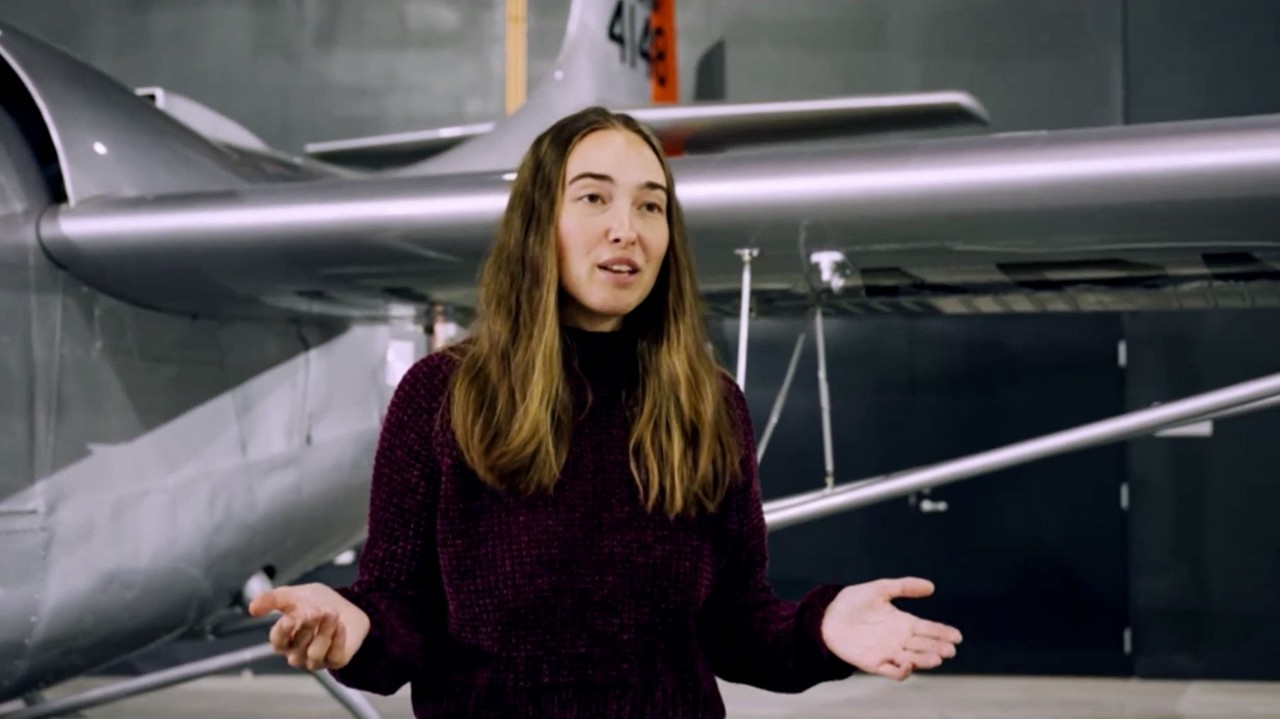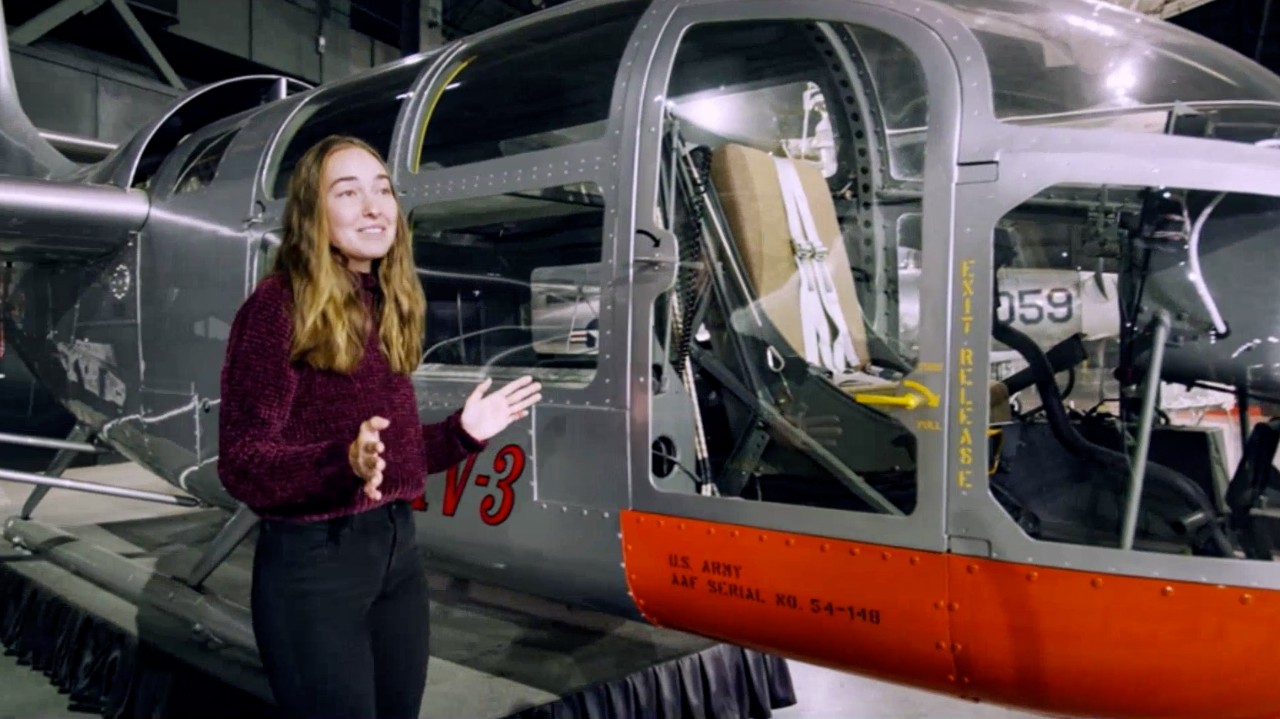
UC student aims to make AI more explainable, trustworthy
Alumna's pursuit to improving machine learning has taken her to multiple countries
Artificial intelligence systems have quickly advanced and can answer just about any question. How they come to their decisions often isn't understood, even by the people who create the AI.

Lynn Pickering
Lynn Pickering, a University of Cincinnati alumna who is working on her doctorate at UC, wants to make sure AI is used safely and responsibly. She wants people to be able to review how AI models come to their answers and ensure humans have opportunities to make final decisions, not the machines.
“We’re not at the point where we should just blindly accept whatever decisions AI gives us, especially for really important decisions,” Pickering said. “We should have models that say, ‘Here’s what I made this decision on,’ so that humans can intervene.”
Oversight of AI
Pickering, who earned a bachelor's degree in aerospace, aeronautical and astronautical engineering from UC, is working toward a doctorate in aerospace engineering, focused on machine learning and interpretable machine learning.
Her studies have taken her around the world, including currently to Ghent University in Belgium where researchers are focusing on the human aspects of interpretable machine learning. She's near Brussels, Belgium, the home of the European Union, which earlier this year passed the EU Artificial Intelligence Act that regulates AI in member nations.
Pickering would like to see the United States implement more AI regulations like Europe, and she hopes after she completes her studies next year she'll be able to contribute to those discussions, in the U.S. or internationally.
While some AI decisions are fairly benign and likely don't need much oversight, such as algorithms that suggest a movie to watch, Pickering said, other applications need more human intervention. She thinks some AI programs offer unacceptable risks, such as facial recognition surveillance in public spaces.
“It’s hard for me to imagine at this point in high-risk scenarios that AI will be able to just go off by itself,” Pickering said. “At least I wouldn’t want that in a country where I was living.”

Lynn Pickering stands in the city of Ghent, Belgium. PIckering is studying at Ghent University, where researchers are focusing on the human aspects of interpretable machine learning. Photo/Lynn Pickering
International travels
A graduate of Walnut Hills High School in Cincinnati, Pickering came to UC for her undergraduate studies in large part because she was excited about the international co-op program. A Cincinnatus Presidential Scholarship recipient, she said the engineering co-op program at UC and opportunity to go abroad was really special for an engineering school.
Pickering's mom grew up in Germany, and she still has family there, which contributed to her desire to live abroad at some point.
She was able to co-op at BMW in Munich, Germany, in 2019. She worked on vibration of plates with a doctoral student, aiming to reduce vibrations that in turn would reduce noise in cars.
In her doctoral studies, Pickering has had multiple opportunities to study internationally, thanks in part to UC’s Office of Nationally Competitive Awards that has helped her apply for fellowships.

Lynn Pickering walks along the coast in Belgium. The University of Cincinnati student received a research fellowship from the Belgian American Educational Foundation, allowing her to continue her studies at Ghent University. Photo/Lynn Pickering
After UC and Coventry University in England announced a collaborative education opportunity to address a global skills shortage in AI, Pickering spent five months in 2022 in the United Kingdom as a visiting doctoral student researcher. Later that year, she received a Fulbright Fellowship to conduct research on explainable AI at Ghent University with professor Bernard De Baets.
“You learn so much more about the world, and you get to meet people who are from different places. You can learn so much from them,” Pickering said of studying abroad. “I would be a lot different if I hadn’t been able to come here and have this experience.”
Last year Pickering received a research fellowship from the Belgian American Educational Foundation, allowing her to continue her studies at Ghent University.
She's also been accepted into this year's ADIA Lab/University of Granada Summer School program in Spain where she'll learn more about trustworthy AI systems.
Learning to adjust to living in a new country has been very valuable, Pickering said. Having been in Belgium for almost two years, she's been able to dig deeper into the nation and joined a soccer team, which has helped her immerse herself in the country and practice her Dutch.
“You learn a lot from it,” she said of her experiences.
Esteemed student
Pickering has received numerous awards, which have helped her pursue her studies in Cincinnati and across the globe.
She received the Rindsberg Fellowship through UC's Jacob D. and Lillian Rindsberg Memorial Fund, which provides a four-year commitment of full tuition and $35,000 per year for engineering students.
Later this year, Pickering will receive the Amelia Earhart Fellowship, a one-time award of $10,000 to help with tuition and cost of living. The fellowship is awarded annually to up to 30 women pursuing doctoral degrees in aerospace engineering and space sciences. Earhart fellows have gone on to become astronauts, aerospace engineers, astronomers, professors, geologists, business owners, heads of companies and even a secretary of the United States Air Force.
“It’s a really great organization that is supporting women around the globe,” Pickering said. “I feel really honored to be a part of that, and I hope to help them in their mission going forward.”

Lynn Pickering stands in front of the Bell XV-3 experimental aircraft for the Science Channel show "Impossible Engineering." Photo/Science Channel
Improving AI
Pickering's research into trustworthy AI could be applicable to all machine learning systems.
She's working with her adviser, Kelly Cohen, PhD, the Brian H. Rowe Endowed Chair in aerospace engineering at UC and director of the AI Bio Lab at UC Digital Futures. Cohen is an expert in fuzzy logic, a computer decision making process that relies on degrees of truth rather than a binary true-false dichotomy.
Computer codes are built on a series of ones and zeros. However, human reasoning is more complex than binary thinking.
As Pickering described, the weather generally isn't 100% sunny or 100% cloudy. Humans are able to understand the complexities and can make decisions based on a large number of factors.
Pickering and Cohen hope their research will help make AI systems better by being able to think more like humans.
While AI systems will continue to improve and be able to handle more complex problems, Pickering isn't convinced that machines should ever be trusted to operate without any human involvement.
“It’s hard for me to imagine that AI should ever be making really important decisions by itself,” she said.
Featured image at top: Lynn Pickering helps explain the engineering behind the world's first tilt-rotor aircraft, the Bell XV-3, for the Science Channel show "Impossible Engineering." Photo/Science Channel
Become a Bearcat
Whether you’re a first-generation student or from a family of Bearcats, UC is proud to support you at every step along your journey. We want to make sure you succeed — and feel right at home.
Tags
- Alumni Association
- International
- Experience-based Learning
- Student Experience
- Aerospace Engineering and Engineering Mechanics
- Office of Research
- College of Engineering and Applied Science
- College of Cooperative Education and Professional Studies
- Science & Tech
- Artificial Intelligence
- Digital Futures
Related Stories
UC student aims to make AI more explainable, trustworthy
July 11, 2024
Artificial intelligence systems have quickly advanced and can answer just about any question, but how they come to their decisions often isn't understood, even by the people who create the AI. Lynn Pickering, a University of Cincinnati alumna who is working on her PhD at UC, wants to make sure AI is used safely and responsibly. She wants people to be able to review how AI models come to their answers and ensure humans have opportunities to make final decisions, not the machines.
Community of AI enthusiasts expands in Cincinnati
June 4, 2024
Much like the rapid development of artificial intelligence, a community of AI builders, users and people who simply are curious about the technology is quickly growing in Cincinnati. In just one month, a post grew into CincyAI for Humans, a group that meets monthly at the University of Cincinnati’s Digital Futures building to network, share successes and learn about AI. #CincyAI
UC co-op student at forefront of AI revolution in electron microscopy
May 20, 2025
Discover how Addie Salvador, a mechanical engineering student from the University of Cincinnati, is revolutionizing electron microscopy at National Renewable Energy Laboratory with AI-driven automation. Her innovative work is advancing materials science, paving the way for breakthroughs in energy storage and microelectronics. Explore her journey at the forefront of scientific discovery and learn how the next generation is shaping a sustainable future.
